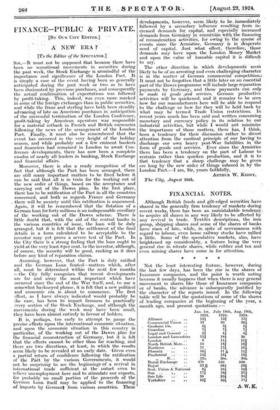FINANCE-PUBLIC & PRIVATE.
[BY OUR CITY ED/TOR.] A. NEW ERA ?• • [To the Editor of the SPECTATOR.] .
SIR,—It must not be supposed that because there have been no sensational movements in securities during the .past week; the Stock ExChange is unmindful of the importance and- significance of the, London Pact. It is simply a case of the event having been so generally anticipated during the past week or two, as to have been discounted .by previous pinchases, and consequently the actual confirmation of expectations was followed by profit-taking.. This, indeed; was even more marked in some of the foreign exchanges than in public securities, and while the franc and sterling have both been steadily advancing-of late on American- purchases • in anticipation of the successful termination of the- London Conference, profit ,takingby American operators was' responsible for a material setback in French and British currencies following the news of the arrangement of the London Pact. Finally, it must also be remembered that the event has occurred in the very height of the holiday season, and while probably not a few eminent bankers and financiers had remained in London to await Con- ference developments, there has now been a complete exodus of nearly all leaders in banking, Stock Exchange and financial affairs.
Moreover, there is also a ready recognition of the fact that although the Pact has been arranged, there are still many important matters to . be fixed before it can be said that all is in train for the working out of the new order of things, based on -the acceptance and carrying out of the Dawes plan. In the first place, there has to be ratification of the Pact in all the countries concerned, and both -as regards France and Germany ..... there will be anxiety until this ratification is announced. Again, it will be remembered that the flotation of a German loan for forty millions is an indispensable corollary of the working out of the Dawes scheme. There is little doubt that, with the aid of the central banks in the various countries of issue, the loan will be duly arranged, but it is felt that the settlement of the final details in a form calculated to be acceptable to the investor may yet prove a severe test of the Pact. In the City there is a strong feeling that the loan ought to yield at the very least 8 per cent. to the investor, although, of course, the security will be good, ranking as it does before any kind of reparation claims.
Assuming, however, that the Pact is duly ratified and the. German Loan floated—matters which, after all, must be determined within the • net few months the City fully. recognizes that recent developments are far and away the most important which have occurred since the end of the War itself, and, to use a somewhat hackneyed phrase, it is felt that a new political and economic era is about to commence. The first effect, as I have always indicated would probably be the case, has been to impart firmness to practically every section of the Stock Exchange, and although the movements during the 'week may have been small, they hive been almost entirely in favour of holders.
It is, perhaps, too early to attempt to gauge the precise _effects _upon the international economic situation, and upon the economic situation in this country in particular, of the working out of the Dawes plan for the financial reconstruction of Germany, but it is felt that the effects cannot be other than far reaching, and there are two -directions, at least, in which the -results t- seem likely to be revealed at an early date. Given even a partial return of confidence following the ratification of the Pat- by the various Governments, it would not, be surprising to see the beginnings of a revival in international trade sufficient at the .outset- even to relieve unemployment here and to stimulate our exports, for probably no small portion of the proceeds of the German Loan itself may be applied -to the financing of imports by Germany from various countries. These developments, however, seem likely to be _ inunediately followed by a secondary influence resulting froM in- Creased demands for_ capital, and especially increased demands from Germanym eonnexiOn with the financing of reconstruction activities; for owing to the epurse of events since the Armistice, Germany is in desperate need of capital. Just :what effect, therefore, those demands may have upon the London Money -Market and upon the value of loanable capital it is difficult to say.
The other direction in which deVelopmenta seem likely to be of an arresting and even challenging character is in the matter of German commercial competition. It must not be forgotten that a little later on an essential part of the Dawes programme will include large reparation payments by Germany, and these payments . can only be made in goods ,.and services. ' German productive activities will be quickened, and it remains to be seen how far our manufacturers here will be able to respond to the challenge or how far they will be held . back by what may be termed Trade Union restrictions. In recent years much has been said and written concerning monetary and currency policy in its relation to our industrial activities, but while I would not minimize the importance of those matters, there has, I think, been a tendency for their discussion rather to . divert attention from the cardinal principle of our having' to discharge our own heavy post-War liabilities in the form of goods and services. Ever since the Armistice there has been a tendency on the part of Labour to restrain rather than quicken production, and it is to that tendency that a sharp challenge may be given ere long by the new order of things ushered in by the London Pact.—I am, Sir, yours faithfully,


































 Previous page
Previous page